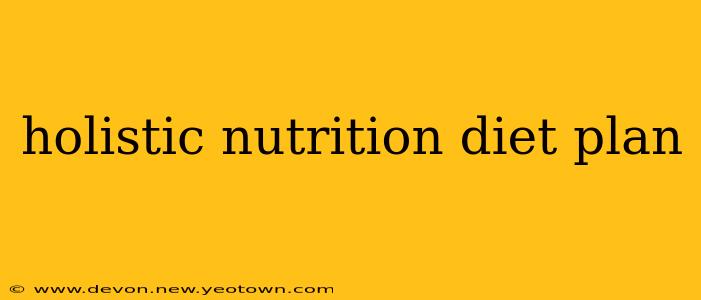Embarking on a holistic nutrition diet plan isn't just about shedding pounds; it's a transformative journey towards vibrant health and well-being. It's about nourishing your body, mind, and spirit, fostering a deep connection between what you eat and how you feel. This isn't a rigid diet; it's a lifestyle shift, a mindful approach to fueling your life.
My name is Anya, and I've spent years researching and practicing holistic nutrition. This plan isn't a one-size-fits-all solution, but a framework to personalize your eating habits for optimal health. Let's dive in!
What is a Holistic Nutrition Diet Plan?
A holistic nutrition diet plan goes beyond simply counting calories or restricting food groups. It considers the interconnectedness of your physical, emotional, and spiritual health. It recognizes that food is medicine, and that nourishing your body with whole, unprocessed foods is crucial for optimal function. Think vibrant fruits and vegetables bursting with nutrients, lean proteins supporting muscle growth, and healthy fats fueling your brain. This plan emphasizes mindful eating, understanding where your food comes from, and appreciating the nourishment it provides.
The Core Principles of Holistic Nutrition
Several key principles guide a holistic nutrition diet plan:
- Whole Foods: Prioritize minimally processed, whole foods like fruits, vegetables, whole grains, legumes, nuts, seeds, and lean proteins. These are packed with nutrients your body needs to thrive.
- Mindful Eating: Pay attention to your body's hunger and fullness cues. Eat slowly, savor each bite, and connect with your food. This helps you develop a better relationship with eating and prevent overeating.
- Hydration: Water is essential for every bodily function. Aim for at least eight glasses of water a day.
- Balanced Macronutrients: Focus on getting a balance of carbohydrates, proteins, and healthy fats. Each plays a crucial role in energy production, muscle building, and overall well-being.
- Individual Needs: Recognize that every body is unique. What works for one person may not work for another. Pay attention to how different foods affect you and adjust your plan accordingly.
- Gut Health: A healthy gut is crucial for overall health. Focus on foods that support a diverse gut microbiome, like fermented foods (yogurt, kefir, sauerkraut) and fiber-rich foods.
- Stress Management: Stress significantly impacts digestion and overall health. Incorporate stress-reducing practices like yoga, meditation, or spending time in nature.
What Foods to Include in Your Holistic Nutrition Diet Plan?
Think abundance! Your plate should be filled with a rainbow of colors:
- Fruits and Vegetables: Aim for at least five servings a day. Choose a variety of colors for a wide range of nutrients.
- Whole Grains: Opt for whole grains like brown rice, quinoa, oats, and whole-wheat bread over refined grains.
- Lean Protein: Include sources like fish, poultry, beans, lentils, and tofu.
- Healthy Fats: Incorporate sources like avocados, nuts, seeds, and olive oil.
What Foods to Limit or Avoid?
While this isn't about strict elimination, minimizing these can greatly benefit your health:
- Processed Foods: Limit processed foods, sugary drinks, and refined carbohydrates, which often lack nutrients and can contribute to inflammation.
- Excessive Sugar: Reduce added sugar intake. It's hidden in many processed foods and can lead to various health problems.
- Trans Fats: Avoid trans fats, often found in processed foods and fried foods.
- Excessive Caffeine and Alcohol: Moderate your intake of caffeine and alcohol.
How to Create Your Personalized Holistic Nutrition Plan?
This is where it gets personal. There is no single “perfect” plan. Consider these steps:
- Consult a Professional: A registered dietitian or holistic nutritionist can help you create a plan tailored to your individual needs and health goals.
- Keep a Food Diary: Track your food intake for a few days to identify eating patterns and areas for improvement.
- Gradual Changes: Don't try to overhaul your diet overnight. Make gradual changes to build sustainable habits.
- Listen to Your Body: Pay attention to how different foods make you feel. If a food causes bloating, discomfort, or other negative effects, consider limiting or eliminating it.
- Find Joy in Cooking and Eating: Make healthy eating enjoyable. Experiment with new recipes, and involve yourself in the process.
H2: What are the benefits of a holistic nutrition diet plan?
The benefits extend far beyond weight management. A holistic approach fosters:
- Improved Digestion: Better nutrient absorption and reduced digestive issues.
- Increased Energy Levels: Consistent energy throughout the day, reduced fatigue.
- Improved Mood: Reduced stress and improved mental clarity.
- Stronger Immune System: A strengthened immune response to fight off illness.
- Weight Management: Sustainable weight loss or maintenance, depending on your goals.
- Better Sleep: Improved sleep quality and reduced insomnia.
- Improved Skin Health: Radiant, healthy-looking skin.
H2: Is a holistic nutrition diet plan suitable for everyone?
While generally beneficial, it's crucial to consult with a healthcare professional, especially if you have underlying health conditions or dietary restrictions. They can help you create a safe and effective plan that meets your unique needs.
H2: How long does it take to see results from a holistic nutrition diet plan?
Results vary depending on individual factors, but you may start noticing improvements in energy levels, digestion, and mood within a few weeks. Significant changes, like weight loss, may take longer. Consistency is key.
Embarking on a holistic nutrition diet plan is a journey of self-discovery and self-care. It's about building a sustainable, healthy relationship with food that nourishes your body and empowers your life. Remember to be patient, compassionate, and celebrate your progress along the way. You deserve to feel your best!

